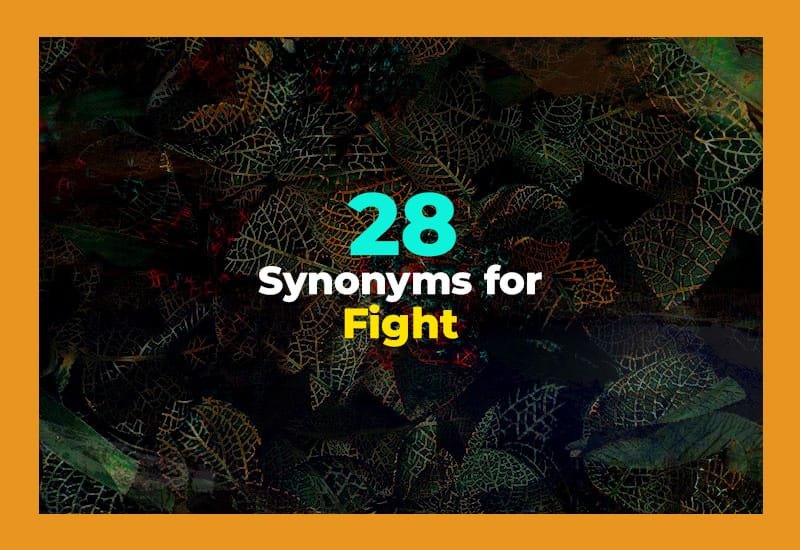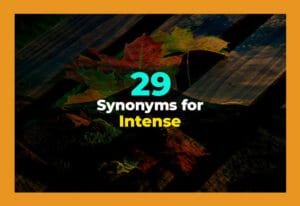A fight can happen in many situations. Sometimes it means a physical struggle, and sometimes it means an argument or a strong effort. People use many different words when they talk about a fight, such as battle, clash, conflict, or struggle. In this article, we will explore 28 useful synonyms for fight with meanings and examples.
| Synonym | Meaning | Example |
|---|---|---|
| Battle | A big fight, often between groups | The two armies prepared for a long battle. |
| Conflict | A serious disagreement or clash | The conflict between neighbors lasted for months. |
| Struggle | A hard effort to achieve something | She had to struggle to finish her work. |
| Clash | A sudden fight or disagreement | The teams had a clash during the match. |
| Combat | A physical fight, often in war | The soldiers entered combat at dawn. |
| Duel | A fight between two people | The knights agreed to a duel. |
| Brawl | A noisy and rough fight | A brawl broke out outside the bar. |
| Skirmish | A small and quick fight | The soldiers had a skirmish near the border. |
| Confrontation | A face-to-face fight or argument | The confrontation grew louder in the meeting. |
| Quarrel | An angry disagreement with words | They had a quarrel about money. |
| Dispute | A serious argument about something | The dispute between the workers and owners continued. |
| Altercation | A loud argument, sometimes physical | An altercation happened in the street. |
| Fray | A fight involving many people | He was caught in the fray at the festival. |
| Tussle | A short, rough struggle | The kids had a tussle over the toy. |
| Scuffle | A brief and messy fight | A scuffle broke out in the classroom. |
| Melee | A confusing fight with many people | The melee left everyone shocked. |
| Hostility | Strong anger and readiness to fight | There was hostility between the two groups. |
| Feud | A long-lasting fight between families or groups | The feud lasted for generations. |
| Riot | A violent public fight | The riot caused damage in the city. |
| Resistance | A fight back against control | The people showed resistance against unfair rules. |
| Campaign | A fight for a cause or goal | She led a campaign for workers' rights. |
| Offensive | A planned attack in war | The army started a major offensive. |
| Aggression | A strong action that starts a fight | His aggression made others nervous. |
| Competition | A fight to win or be the best | The competition between teams was strong. |
| Disagreement | A smaller fight with words | They had a disagreement during lunch. |
| Strife | Bitter fight or trouble | The country faced strife for years. |
| Rebellion | A fight against authority | The rebellion grew stronger each day. |
| Warfare | Large-scale fighting between groups | The country suffered from years of warfare. |
28 Different Ways to Say FIGHT: Another Word for FIGHT
Battle
The word "battle" usually describes a large fight, often between groups, armies, or teams. However, people also use it for personal struggles, like battling illness or stress. It shows effort, energy, and determination. A battle is not always physical; it can be emotional, mental, or even spiritual. Understanding this synonym helps express strong effort in many areas of life.
- The battle against pollution continues.
- They won the battle but not the war.
- She faced a battle with her health.
Conflict
Conflict means a serious disagreement or struggle between two or more sides. It can happen between people, groups, or even inside ourselves when we cannot decide. Conflicts are not always violent, but they can lead to fights if not solved. This synonym is often used to explain differences in opinions, goals, or needs.
- The conflict between friends made them upset.
- The office conflict slowed down the project.
- He felt inner conflict about his choice.
Struggle
Struggle means working very hard against something difficult. It can be a physical fight, but more often it shows effort in life. People struggle for success, money, love, or even survival. This synonym reminds us that not every fight is about violence. Sometimes it is about daily challenges that we need to overcome.
- She had to struggle to pass the exam.
- They struggled to survive the storm.
- He struggled to find the right words.
Clash
Clash describes a sudden fight or disagreement. It can happen between people, teams, or even ideas. A clash does not always mean physical violence; it can mean strong differences that lead to arguments. The word often suggests something noisy or dramatic. Clashes can happen quickly and may or may not last long.
- The clash between the players shocked the crowd.
- Their ideas clashed during the debate.
- The clash of cultures created new challenges.
Combat
Combat is often used when talking about war or the military. It refers to physical fighting between soldiers or groups. However, people also use combat in daily life to describe fighting against problems. It suggests direct action, strength, and danger. Combat can be intense and usually involves weapons or physical skills.
- The soldier faced combat in the desert.
- He learned martial arts for combat training.
- They joined together to combat disease.
Duel
A duel is a fight between two people, often with weapons. In history, duels were formal and followed rules, like sword or pistol duels. Today, the word can also mean a strong contest between two sides. It always suggests one-on-one struggle, whether physical, verbal, or competitive.
- The knights prepared for a duel at dawn.
- The duel between singers entertained the crowd.
- He faced a duel with his rival in court.
Brawl
Brawl means a noisy and messy fight, usually involving many people. It often happens in public places like bars, streets, or stadiums. Brawls are usually not planned; they start suddenly and can grow quickly. The word suggests chaos, shouting, and sometimes violence.
- A brawl broke out after the match.
- Police stopped the brawl in the market.
- The brawl scared nearby families.
Skirmish
A skirmish is a small and short fight. It often happens in war but not on a large scale. Skirmishes are quick, sharp, and usually not as serious as battles. People also use the word for small arguments or brief confrontations in daily life.
- Soldiers had a skirmish near the border.
- A skirmish started between neighbors.
- The skirmish ended before police arrived.
Confrontation
Confrontation means facing someone directly in a fight, argument, or disagreement. It can be physical or verbal. The word shows tension and strong emotion. A confrontation often happens when people refuse to step back or compromise. It can be stressful but sometimes necessary to solve problems.
- The confrontation grew heated in the meeting.
- Police had a confrontation with protesters.
- Their confrontation ended in silence.
Quarrel
A quarrel is an argument, usually with words, not fists. Quarrels can happen between friends, couples, or family members. They are often about small issues but can grow bigger if not solved. A quarrel usually includes anger, hurt feelings, and loud voices.
- They had a quarrel over money.
- The quarrel made them stop speaking.
- A quarrel broke out at the dinner table.
Dispute
Dispute means a serious argument about something important, such as property, money, or rules. It is often more formal than a quarrel and may even go to court. A dispute can last a long time and usually involves strong disagreement.
- The dispute between workers and owners continued.
- A land dispute caused trouble in the village.
- The dispute ended after long talks.
Altercation
Altercation means a noisy or angry argument, sometimes turning physical. It suggests strong words and possible violence. Altercations usually happen suddenly in public and may involve strangers. This synonym shows more seriousness than a quarrel and often needs someone to break it up.
- An altercation happened in the street.
- The altercation stopped when police arrived.
- A loud altercation scared the customers.
Fray
Fray describes a fight involving many people. It can also mean a situation full of action and stress. Being "in the fray" means being caught up in the fight or conflict. This word is often used when someone is suddenly pulled into a situation.
- He was caught in the fray during the protest.
- The fray grew bigger as more people joined.
- They stayed away from the fray to avoid trouble.
Tussle
A tussle is a short, rough fight, often not very serious. It can happen between children, animals, or even adults. A tussle usually involves pushing, pulling, or wrestling but not major violence. It can also mean a small struggle for control.
- The kids had a tussle over the toy.
- He had a tussle with his brother.
- A quick tussle ended in laughter.
Scuffle
Scuffle means a short and messy fight, often without weapons. It usually happens suddenly and ends quickly. A scuffle can be between two people or more. The word suggests disorder but not usually serious injury.
- A scuffle broke out in the classroom.
- They had a scuffle outside the store.
- The scuffle ended before teachers arrived.
Melee
Melee means a confusing fight with many people involved. It is usually violent, noisy, and hard to control. In a melee, people may not even know who they are fighting. It shows complete disorder and chaos.
- The melee left everyone shocked.
- A melee started during the concert.
- Police broke up the melee in the street.
Hostility
Hostility means strong anger and readiness to fight. It does not always mean physical fighting but shows tension and unfriendly feelings. Hostility can last a long time between people or groups. It often creates fear or distance.
- There was hostility between the two groups.
- Hostility grew after the argument.
- The meeting ended with open hostility.
Feud
A feud is a long-lasting fight, often between families or groups. Feuds can go on for years or even generations. They usually involve revenge, anger, and deep dislike. A feud is stronger than a simple quarrel because it never ends quickly.
- The feud lasted for generations.
- A feud between neighbors caused problems.
- The feud turned violent after years of anger.
Riot
A riot is a violent public fight involving many people. It often happens during protests or social unrest. Riots cause damage, noise, and chaos. They can grow quickly and become dangerous for everyone nearby.
- The riot caused damage in the city.
- Police worked to stop the riot.
- A riot started after the match.
Resistance
Resistance means fighting back against control, power, or pressure. It is not always physical; it can be peaceful or strong opposition. People use resistance to protect rights or to show they disagree with rules or unfair actions.
- The people showed resistance against unfair rules.
- She offered resistance to the plan.
- Resistance grew stronger each day.
Campaign
Campaign is a fight for a cause, goal, or idea. It is usually organized and planned. Campaigns are not physical fights but efforts to win support or change something. It shows energy, planning, and determination.
- She led a campaign for workers' rights.
- The campaign helped stop pollution.
- They started a campaign for health awareness.
Offensive
An offensive means a planned attack, often in war. It involves strategy, movement, and direct fighting. People also use the word for strong actions in sports or debates. An offensive shows a powerful push to defeat the other side.
- The army started a major offensive.
- Their offensive surprised the enemy.
- The team took an offensive position.
Aggression
Aggression means strong and sometimes violent behavior. It often starts a fight. Aggression shows force, anger, and readiness to attack. This word can describe both physical actions and unfriendly behavior.
- His aggression made others nervous.
- The dog showed aggression toward strangers.
- Aggression led to a big problem.
Competition
Competition is a fight to win or to be the best. It happens in sports, business, or daily life. Competition is not always violent but shows effort, rivalry, and challenge. It pushes people to do better but can also cause tension.
- The competition between teams was strong.
- She entered a writing competition.
- Competition made the market tough.
Disagreement
Disagreement is a small fight with words, usually about opinions. It does not always become serious but can hurt relationships if repeated often. Disagreement is common in daily life and shows differences in thinking.
- They had a disagreement during lunch.
- The disagreement ended quickly.
- Disagreement slowed down the project.
Strife
Strife means serious trouble, conflict, or fighting that lasts a long time. It can happen in families, groups, or even countries. Strife suggests pain, stress, and division.
- The country faced strife for years.
- Family strife made life difficult.
- Strife grew because of unfair rules.
Rebellion
Rebellion means fighting against authority or rules. It can be violent or peaceful. Rebellions often happen when people feel unfairly treated and want change. It shows resistance, courage, and action.
- The rebellion grew stronger each day.
- A rebellion started against the king.
- They joined the rebellion for freedom.
Warfare
Warfare means large-scale fighting, often between countries or groups. It includes battles, strategies, and long conflicts. Warfare is destructive and affects people deeply. It is one of the strongest words for fight.
- The country suffered from years of warfare.
- Modern warfare uses advanced technology.
- Warfare caused great loss.

Final Thoughts
There are many ways to say fight, and each synonym carries a unique meaning. Some describe physical battles, while others show disagreements, struggles, or resistance. Knowing these synonyms helps us speak with variety and express situations more clearly. By learning these words, we can better describe conflicts in both life and history.









